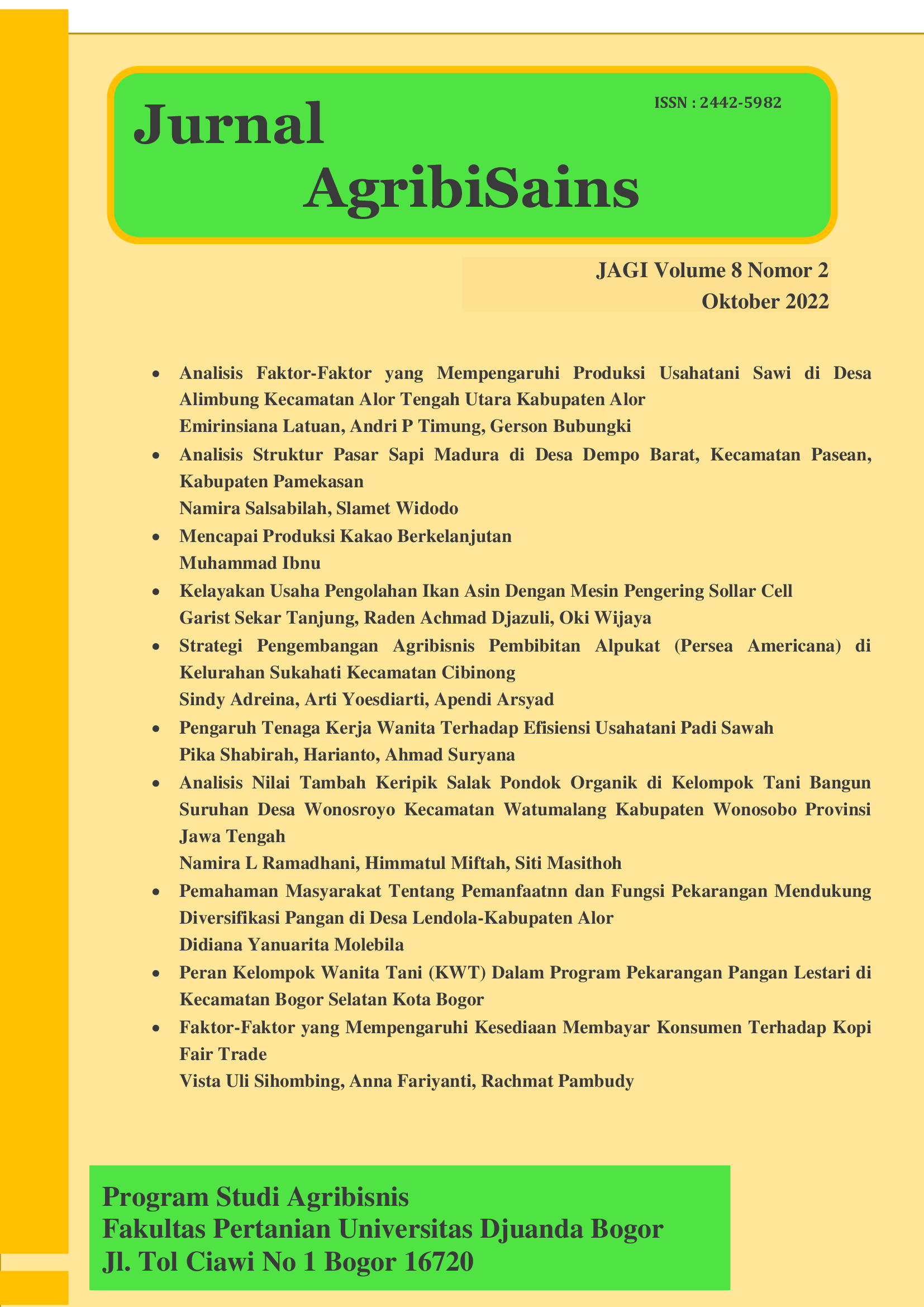FAKTOR-FAKTOR YANG MEMPENGARUHI KESEDIAAN MEMBAYAR KONSUMEN TERHADAP KOPI FAIR TRADE
DOI:
https://doi.org/10.30997/jagi.v8i2.6547Keywords:
Fair trade coffee, willingness to pay, logistic regretionsAbstract
Coffee drink products that have a fair trade label tend to have a higher price than non-fair trade label coffee drinks, so that some consumers perceive that coffee is an expensive product. This study aims to determine how much consumers are willing to pay for coffee drinks labeled as fair trade and the factors that influence it. This study uses primary data from an online survey of 120 respondents in North Sumatra Province who have purchased coffee drinks with a fair trade label. Data analysis used logistic regression analysis. The results show that the majority of consumers are willing to pay more for coffee drinks labeled as fair trade with an increase of 5-10% from the current product price. The factors that influence the willingness to pay for coffee drinks labeled as fair-rade are age, education, marital status and coffee quality.
References
Adiyoga W, Setyowati T, Ameriana M, Nurmalinda N. 2009. Perilaku Konsumen Terhadap Jeruk Siam Di Tiga Kota Besar Di Indonesia. J Hortik. 19(1):82434. doi:10.21082/jhort.v19n1.2009.p.
Afriyanti S, Rasmikayati E. 2017. Studi Strategi Pemasaran Terbaik Berdasarkan Perilaku Konsumen Dalam Menghadapi Persaingan Antar Kedai Kopi Di Jatinangor. J Ilm Mhs Agroinfo Galuh. 3(3):480–497. doi:10.25157/jimag.v4i3.818.
AOI [Aliansi Organis Indonesia]. 2015. Statistika Pertanian Organik Indonesia. Bogor: Penerbit AOI.
Arnot C, Boxall PC, Cash SB. 2006. Do ethical consumers care about price? A revealed preference analysis of fair trade coffee purchases. Can J Agric Econ. 54(4):555–565. doi:10.1111/j.1744-7976.2006.00066.x.
Aryal KP, Chaudhary P, Pandi S, Sharma G. 2005. Consumers’ Willingness to Pay for Organic Products: a Case from Kathmandu Valley. The Journal of Agriculture and Environment. 10(2): 12–22.
Canavari M, Bazzani GM, Spadoni R, Regazzi D. 2002. Food Safety and Organic Food Demand in Italy: a Survey. British Food Journal. 104(3): 187–199.
De Pelsmacker P, Driesen L, Rayp G. 2005. Do consumers care about ethics? J Consum Aff. 39(2):363–386. doi:10.1177/1470593113477887.
Fair trade. 2016. Market at a glance [Online]. http://www.fairtrade.org.za/ uploads/files/Research/Facts_Figures/Market_at_a_Glance_Jan_2016.pdf, 2017, March 20
Fajria F, Ethika D, Kusnaman D. 2020. Analisis Kesediaan Membayar (Willingness to Pay) Konsumen Terhadap Sayuran Organik Di Pasar Modern Purwokerto dan Faktor Yang Mempengaruhi. SEPA. 17(1): 40-48.
Fridell G. 2014. Fair trade slippages and Vietnam gaps: the ideological fantasies of fair trade coffee. Third World Q. 35 (7):1179-1194.
Gleim MR, Smith JS, Andrews D, Cronin JJ. 2013. Against the green: A multi-method examination of the barriers to green consumption. J. Retail. 89: 44–61.
Govindasamy R dan Italia J. 1999. Predicting Willingness to Pay a Premium for Organically Grown Fresh Produce. Journal of Food Distribution Research. 30(2): 44–53.
Hamari J, Sjöklint M, Ukkonen A. 2015. The Sharing Economy: Why People Participate in Collaborative Consumption. J Assoc Inf Sci Technol. 67(9):2047–2059.
Hamazaoui L, Zahaf M. 2012. Canadian Organic Food Consumers' Profile and Their Willingness to Pay Premium Prices. Journal of International Food and Agribusiness Marketing. 24(1): 1-21.
Hersleth M, Monteleone E, Segtnan A, Næs T. 2015. Effects of evoked meal contexts on consumers’ responses to intrinsic and extrinsic product attributes in dry-cured ham. Food Qual. Prefer. 40: 191–198.
ICO [International Coffee Organization]. 2018. Coffee Market Report. Available online: http://www.ico.org
ICO [International Coffee Organization]. 2021. Coffee year production by country. Data. May 2021 August:7–9.
Kasali R. 2010. Change. Jakarta: Gramedia Pustaka Utama
Kotler P dan Armstrong G. 2008. Prinsip-Prinsip Pemasaran Ed Ke-12. Bob S, penerjemah; Adi M, Devri B, Wibi H, editor. Jakarta (ID): Erlangga. Terjemahan dari: Principles of Marketing Twellfth Ed.
Loureiro ML dan Lotade J. 2005. Do fair trade and eco-labels in coffee wake up the consumer conscience? Ecol Econ. 53(1):129–138. doi:10.1016/j.ecolecon.2004.11.002.
Ling CY. 2013. Consumers’ purchase intention of green products: an investigation of the drivers and moderating variable. Elixir. Int. J. Mark. Manag. 57A: 14503–14509.
Rodriguez E, Lacaze V, Lupin B. 2007. Willingness to Pay for Organic Food in Argentina: Evidence from a Consumer Survey. 105th EAAE Seminar ‘International Marketing and International Trade of Quality Food Products’. Italy: Bologna.
Samoggia A, Riedel B. 2018. Coffee consumption and purchasing behavior review: Insights for further research. Appetite. 129: 70–81.
Sinaga SV. 2019. Pengaruh Sertifikasi Terhadap Kinerja Usahatani Kopi Lintong Sumatera Utara. [Tesis]. Bogor (ID) : Institut Pertanian Bogor.
Sumarwan U. 2011. Perilaku Konsumen. Bogor: Penerbit Ghalia Indonesia.
Vitell SJ. 2015. A Case for Consumer Social Responsibility (CnSR): Including a Selected Review of Consumer Ethics/Social Responsibility Research. J Bus Ethics. 130(4):767–774. doi:10.1007/s10551-014-2110-2
Willer H, Sampson G, Voora V, Dang D, Lernoud J. 2019. The State of Sustainable Markets 2019. http://www.intracen.org/uploadedFiles/intracenorg/Content/Publications/State-of-Sustainable-Market-2017_web.pdf.
Wolf MM, Romberger CL. 2010. Consumer Attitudes Towards Fair trade Coffee. Di dalam: AARES National Conference 2010; 2010 Feb 10-12; Adelaide, Australia. hlm 1–10; [diakses 2021 Des 20]. https://ageconsearch.umn.edu/record/59264/files/Wolf_%20Marianne%20McGarry.pdf
Yang S-H, Hu W, Mupandawana M, Liu Y. 2012. Consumer Willingness to Pay for Fair trade Coffee: A Chinese Case Study. J Agric Appl Econ. 44(1):21– 34. doi:10.1017/s1074070800000146.
Yang S-H, Qing P, Hu W, Liu Y. 2014. Product information and Chinese consumers’ willingness-to-pay for fair trade coffee. China Agric Econ Rev. 6(2):278–294
Downloads
Published
How to Cite
Issue
Section
License
Copyright (c) 2022 JURNAL AGRIBISAINS

This work is licensed under a Creative Commons Attribution-ShareAlike 4.0 International License.
Authors who publish with Jurnal AgribiSains agree to the following terms:
- Authors retain copyright and grant the journal right of first publication with the work simultaneously licensed under a Creative Commons Attribution Share-Alike 4.0 International License that allows others to share the work with an acknowledgement of the work's authorship and initial publication in Jurnal AgribiSains.
- Authors are able to enter into separate, additional contractual arrangements for the non-exclusive distribution of the journal's published version of the work (e.g., post it to an institutional repository or publish it in a book), with an acknowledgement of its initial publication in Jurnal AgribiSains.
- Authors are permitted and encouraged to post their work online (e.g., in institutional repositories or on their website) prior to and during the submission process, as it can lead to productive exchanges, as well as earlier and greater citation of published work.









